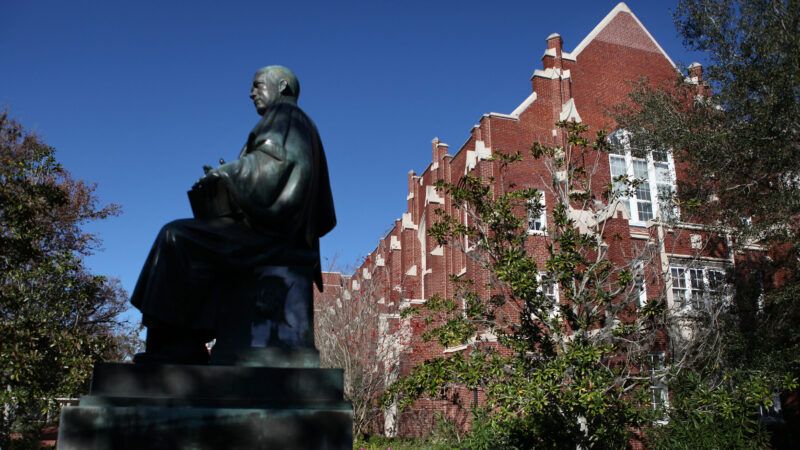University of Florida Bans Professors From Testifying Against State Voting Law
"Outside activities that may pose a conflict of interest to the executive branch of the State of Florida create a conflict for the University of Florida," said the university in a statement.

The University of Florida forbade three of its professors from testifying as expert witnesses in a lawsuit challenging a new Florida voting law, according to documents filed by the plaintiffs in the lawsuit.
The law in question, S.B. 90, was one of a glut of new laws passed earlier this year in Republican-led states. Among other things, S.B. 90 put new limitations on voting by mail and ballot drop boxes. Florida Gov. Ron DeSantis signed the bill into law in May. The same month, a group of voting rights advocates sued to block it, saying that it violated the Voting Rights Act and would disproportionately harm people of color.
To bolster their case against the law, the plaintiffs sought to enlist the testimony of three professors from the University of Florida (UF): Daniel Smith, Michael McDonald, and Sharon Austin, experts in election law, voting behaviors, and voting rights. The university, however, denied the professors' requests, saying in part, "Outside activities that may pose a conflict of interest to the executive branch of the State of Florida create a conflict for the University of Florida." As a public university, UF receives state funding, but consequently, it also has First Amendment obligations to its students and faculty that a private university would not have. The denial was news to the professors—in fact, as The New York Times reported, Smith had previously "testified with the University of Florida's permission in two voting rights lawsuits against Florida's Republican-led government in 2018."
Over the weekend, UF President Kent Fuchs and Provost Joe Glover jointly issued a statement, affirming the university's dedication to academic freedom and freedom of speech, announcing the appointment of a "task force" to "review" the university's policy on conflicts of interest for "consistency and fidelity," and further clarifying that "if the professors wish to testify pro bono on their own time without using university resources, they are free to do so."
However, as McDonald tweeted last week, "Our compensation was not given as a reason in the original disapproval" from the university. Smith declined Reason's request for comment, citing possible litigation. However, in a statement to Fuchs that was provided to Reason, David O'Neill and Paul Donnelly, attorneys representing the three professors, assert that "Prohibiting Professors from giving standard expert testimony, and instead only allowing pro bono testimony, undermines their credibility as expert witnesses and chills their speech."
Smith's C.V., linked on the school's website, lists multiple pages of experience as a consultant, lead author, or expert witness on behalf of plaintiffs, including several filed against the state of Florida. In only three total cases does he list himself as having appeared pro bono. Jennifer Garrett, media strategist for the American Civil Liberties Union of Florida (one of the plaintiffs referenced on Smith's C.V.), confirmed to Reason that Smith was compensated for his work with them.
In theory, it is entirely possible for a government entity to restrict the ways in which its employees speak out in their capacity as employees. National Review's Dan McLaughlin writes that even though "academics are not bound by a code of ethics or a duty of loyalty to their employers," they do still serve as state employees, and they should not be able to use "the imprimatur of their status as state-university professors to make the case against the state before a judge or jury."
However, as the Foundation for Individual Rights in Education (FIRE) said in a letter to the school, the Supreme Court ruled in Lane v. Franks (2014) that "Truthful testimony under oath by a public employee outside the scope of his ordinary job duties is speech as a citizen for First Amendment purposes." In a press release, FIRE said: "It doesn't matter if the professors are paid for their labor, or if the labor is provided pro bono. They have a right to testify."
On Tuesday, a fourth UF professor came forward claiming that he had been prevented from providing expert testimony. As reported by The Chronicle of Higher Education, Jeffrey Goldhagen, a professor of pediatrics at the UF College of Medicine in Jacksonville, was asked to provide expert testimony this summer in a series of cases regarding DeSantis' ban on mask mandates. Despite assurances that he did not expect to be paid, and that he "would be participating as a private citizen, and not as a UF faculty member," Goldhagen's requests were denied on the basis that because "UF is an extension of the state as a state agency, litigation against the state is adverse to UF's interests."
Critics of UF's actions have blamed the DeSantis administration, pointing out that the chairman of UF's Board of Trustees, Morteza Hosseini, is a DeSantis adviser. DeSantis' office has denied any involvement with UF's decision. Either way, it's unclear how professors providing testimony on specific state policies within their respective areas of expertise could be "adverse to [the] interests" of the university, unless the university feared some kind of retaliation from the DeSantis administration.
It remains to be seen whether the school's policy is unconstitutional, but at the very least, it is counter to the promotion of free speech on college campuses. As FIRE attorney Aaron Terr wrote in a letter to Fuchs, "The notion that a government actor such as UF can suppress truthful testimony in court out of a general concern that the testimony would be 'adverse' to the government's interests is completely alien to the First Amendment and harmful to the administration of justice."


Show Comments (87)